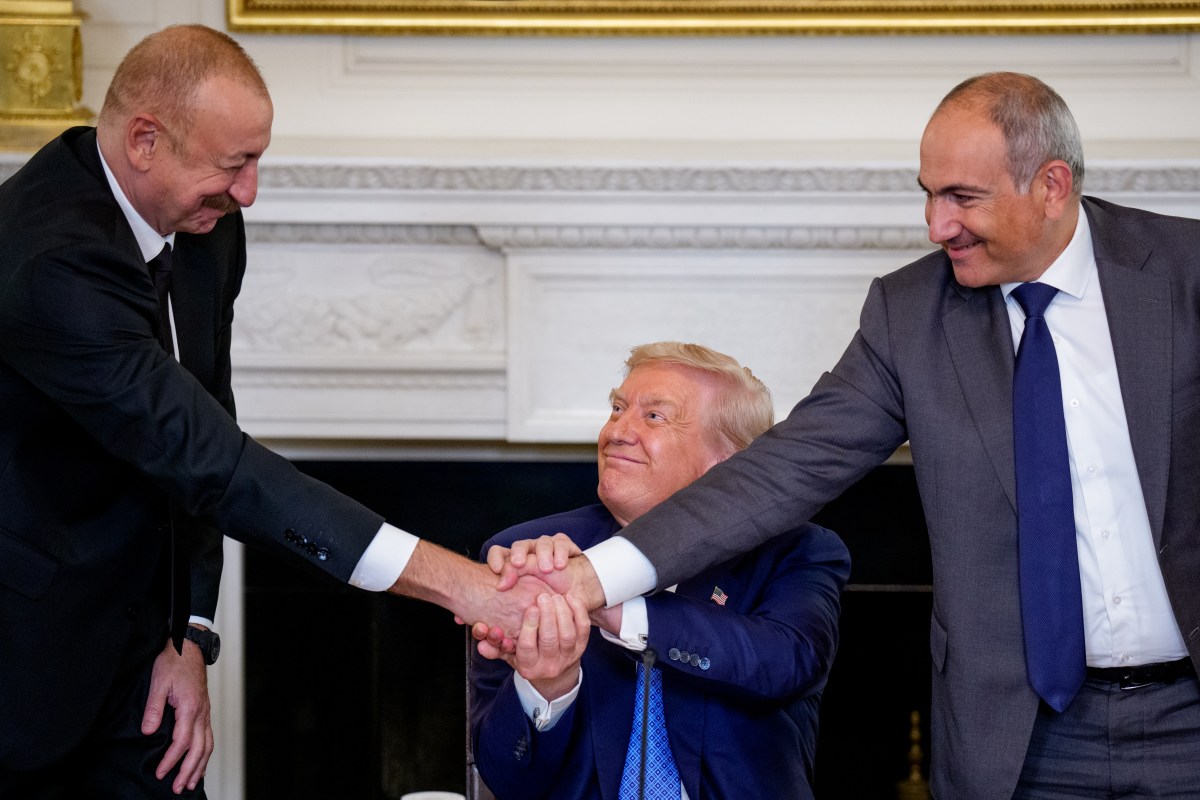Big changes are afoot in the South Caucasus. Back in August, in a move that passed largely unnoticed in the American press, the Trump administration pulled off a major diplomatic coup when it brought together Azerbaijani President Ilham Aliyev and Armenian Prime Minister Nikol Pashinyan to ink a joint declaration formally ending decades of hostility between the two regional rivals.
The resulting statement included commitments by both sides to respect each other’s sovereignty and territorial integrity, as well as to renounce the use of force to acquire land — something that had bedeviled their relations for decades. The August meeting also included a major trade component, with the U.S. securing rights to develop the Zangezur Corridor, now renamed the Trump Route for International Peace and Prosperity (TRIPP).
As envisioned, TRIPP will run through southern Armenia, linking Azerbaijan with its territorial exclave of Nakhchivan and bringing economic prosperity to both countries — as well as to the American companies and stakeholders that become involved there.
However, Armenia is now facing an informational assault from three separate directions, as political stakeholders attempt to undermine the nascent peace effort and force Yerevan to reject the economic dividends and pro-Western politics that accompany it.
**1. The Russian Factor**
The first challenge emanates from Russia. While the Kremlin formally welcomed the Armenia-Azerbaijan peace deal, the weeks since have seen a veritable deluge of negative media coverage that tells a very different story. Outlets like *Komsomolskaya Pravda* have accused Pashinyan of “selling out his Motherland” and betraying Armenian national interests.
Margarita Simonyan, editor-in-chief of Russia Today and arguably Moscow’s most notorious propagandist, has called the Armenian premier “a degenerate,” “a traitor,” and a “CIA puppet without honor or conscience.”
This harsh rhetoric reflects just how much Moscow stands to lose if the deal holds and TRIPP becomes a reality. Russia has long wielded controlling influence over Armenian politics, including a long-term military presence on Armenian soil.
The new Armenia-Azerbaijan peace deal states that “there shall not deploy along their mutual border forces of any third party”—an edict Kremlin officials clearly fear might be used to evict Russian troops from the country.
The economic implications of TRIPP are also worrisome for Moscow, as the corridor effectively displaces Russia as a guarantor of commerce in the area. Additionally, Moscow fears exclusion from any new security architecture for the region, which could diminish its traditionally extensive influence.
**2. Iranian Concerns**
The second source of opposition comes from Iran. Iran’s *Javan Online*, a mouthpiece of the country’s clerical army, the Islamic Revolutionary Guard Corps, has depicted the agreement as nothing short of an Armenian capitulation to Azerbaijan’s demands.
Meanwhile, Iranian experts have warned against the new agreement, arguing that it directly affects “the territorial integrity, national sovereignty, and the status of Iran as a regional power.”
Their trepidation is understandable. For decades, Iran enjoyed extensive security cooperation with successive governments in Armenia. Tehran naturally opposes any project that might complicate this access or interfere with its ability to pressure an increasingly Westward-looking Azerbaijan, which Tehran also sees as a rival.
Senior officials like Ali-Akbar Ahmadian, secretary of Iran’s Supreme National Security Council, have publicly warned that the Islamic Republic will not permit any outside power to undermine its relations with Armenia.
**3. Opposition from Armenia’s Own Diaspora**
Surprisingly, the third challenge arises from within Armenia’s own diaspora community. The Armenian National Committee of America (ANCA), which claims commitment to “truth, justice, peace & freedom for Armenians and allied Americans,” has taken a stance against the new peace deal with Azerbaijan from the beginning.
ANCA representatives have denounced the August 8 arrangement as nothing short of a surrender of Armenia’s “sovereign rights to a neo-colonial U.S.-backed corporate consortium.”
Here, Armenia’s internal politics play a crucial role. Over the past several years, Pashinyan’s government has embarked upon a controversial political reorientation — progressively abandoning the country’s traditional reliance on Russia and Iran in favor of not just normalization with neighboring Azerbaijan but also an accelerating pro-Western tilt.
Yet the continuity of this political trajectory is not guaranteed. Pashinyan’s ruling Civil Contract Party has declined in popularity in recent years due to a variety of social and economic factors. Next year, in the country’s parliamentary elections, it will face stiff opposition. The outcome could determine whether Armenia reverts to its previous pro-Russian and pro-Iranian position.
**The Stakes Are High**
The stakes could not be clearer. If Pashinyan perseveres and the fledgling peace with Baku holds, the biggest losers will be Moscow and Tehran, both of which will forfeit an erstwhile ally in the South Caucasus. Disadvantaged too will be proponents of the traditional political status quo in Yerevan.
That is why Armenia now faces an information war on three fronts. It is also why ensuring the success of Armenian-Azerbaijani normalization counts as a vital American interest.
—
*Ilan Berman is senior vice president of the American Foreign Policy Council in Washington, D.C. The views expressed in this article are the writer’s own.*
https://www.newsweek.com/armenia-faces-an-information-war-on-three-fronts-opinion-11042680
